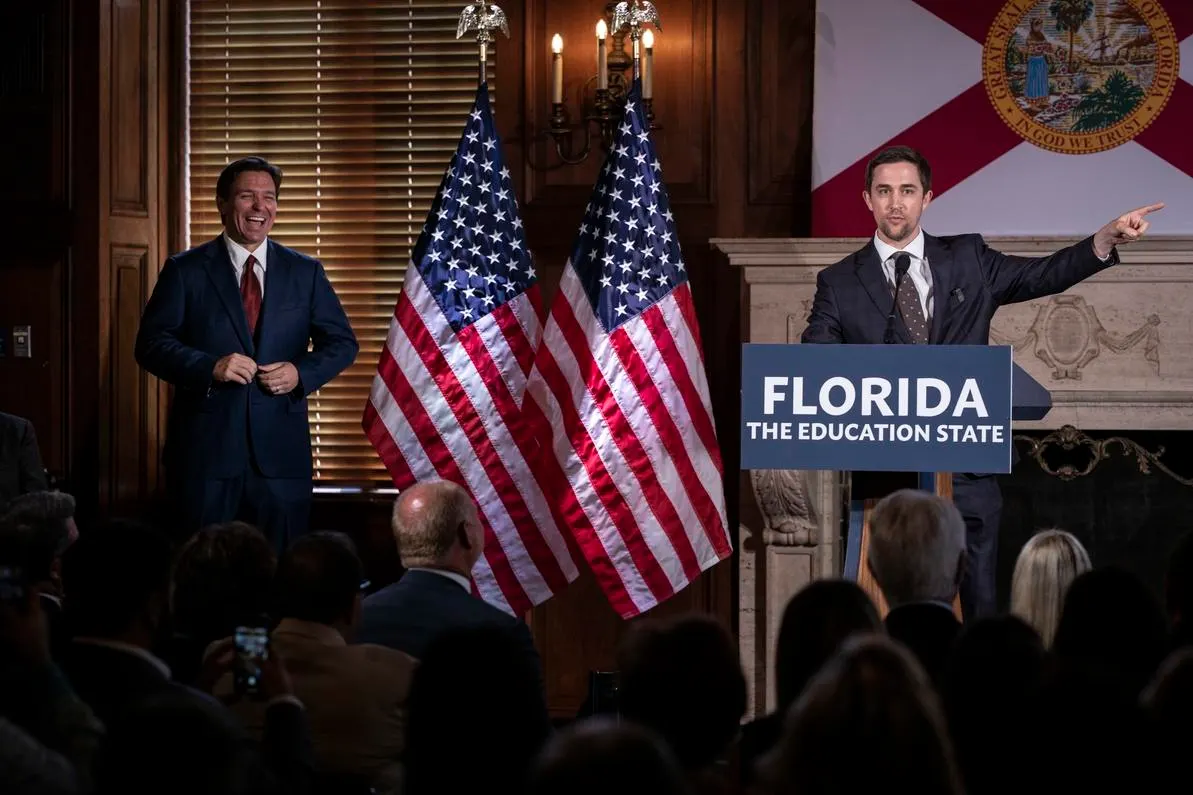Copyright forbes

Florida Governor Ron DeSantis listens to activist and New College of Florida trustee Christopher Rufo before a Bill signing on New College's Campus. New College has said it wants to sign the Trump Administration's so called "Compact with Higher Education." The Washington Post via Getty Images New College in Florida wants to be the first school to sign President Trump’s so called “Compact with Higher Education”. In a press release, the public liberal arts college said that it has already instituted many elements outlined in the compact and would be honored to be the first institution to sign the agreement. The compact would give the federal government unprecedented control over what colleges are allowed to teach, who is allowed to teach, limitations on how students can protest, and over college’s admission processes. The requirements would, if agreed to by any college, have an enormous impact on the student experience and admissions process at colleges that agree to the terms of the agreement, as well as placing severe limitations on academic freedom. New College is one of the few public liberal arts colleges in the country but has courted controversy over the past two years, since new leadership and board members were installed Governor Ron DeSantis. The changes were part of an explicit attempt to turn the college into a conservative poster child for re-imagining higher education. The change in leadership at New College led to changes in curriculum, recruiting, elimination of multiple programs of study, and the introduction of an athletics program Faculty and students fled the institution in large numbers as the new leadership team have tried to put a conservative mark on a school historically known to be a haven for progressive ideas. New College was not on the initial list of institutions the compact was shared with but seems eager to gain any benefit it can with federal funding. MORE FOR YOU What Is In The “Compact With Higher Education”? The Compact would require colleges to agree to much greater federal control over how they operate, and a range of policies, including: Freeze tuition for at least five years and requires colleges with endowments of more than $2 million per student not to charge tuition at all for students enrolling in the hard sciences. Limit international student enrollment to 15% or less. Remove all considerations of race and gender from admissions and require standardized tests like the SAT or ACT for admission. Significant limitations on free speech and the right to protest on campus. Require a policy of “institutional neutrality, which would include restricting the speech of employees when acting in their official capacities. Close departments that “belittle” or “punish” conservative ideas. Require that colleges consider sex as immutable characteristics. Limit grade inflation. Regularly and anonymously poll students to gauge compliance with the compact. Expand opportunities for veteran students. Colleges that sign the compact will be given unspecified advantages, but the benefits, including possible preferential treatment when applying for federal research funding, are only mentioned in the cover letter accompanying the agreement. The compact itself fails to specify what advantages colleges would gain if they signed but does say that “colleges that do not want to sign can “elect to forgo federal benefits. Which Colleges Received The Compact With Higher Education? The compact was originally sent to nine institutions-- Brown University, Dartmouth College, Massachusetts Institute of Technology, University of Arizona, University of Pennsylvania, University of Southern California, University of Texas at Austin, University of Virginia, and Vanderbilt University. The only institution other than New College that has been publicly enthusiastic about the compact is the University of Texas, Austin. The school initially responded to the compact with a positive public statement but has said nothing else publicly about the agreement since that statement. None of the original nine have accepted the offer, although the University of Austin Texas released a statement suggesting it was open to the compact, and Vanderbilt offered feedback on specific elements of the agreement to the Trump administration. MIT was the first university to reject the compact. The rejection letter from President Sally Kronbluth noted that MIT was more than willing to “compete with the very best, without preferences.” Several other rejections have highlighted that research funding should be awarded based on merit, not preferential treatment. "I do not believe that a compact—with any administration—is the right approach to achieve academic excellence, as it would compromise our academic freedom, our ability to govern ourselves, and the principle that federal research funds should be awarded to the best, most promising ideas, said Dartmouth President, Sian Leah Beilock in her letter to campus explaining why Dartmouth was turning down the compact. How Popular Is The Compact With Higher Education With The Public? The compact is proving to be deeply unpopular with Americans, with 57% of Americans saying they oppose increasing the federal government’s role in how colleges and universities operate. These results come from a nationally representative poll of 1,519 Americans, first reported on by The Chronicle of Higher Education. When asked if colleges should agree to the compact to receive preferential funding treatment, 62% of poll respondents said that colleges should not agree to the deal. Even among Trump supporters, fewer than half of poll respondents supported increasing federal involvement in how colleges run. Will Other Schools Follow New College’s Example? So far, no other colleges have said they will sign the compact, and given how unpopular the agreement is, it seems unlikely that a large number of colleges will match New College’s enthusiasm for the compact. “New College is Florida’s Honors College for a reason.” said Debra Jenks, Chair, New College Board of Trustees. “I would encourage everyone who wants to see what a revitalized campus looks like based on academic excellence, public discourse, and integrity to visit New College of Florida and see it for yourself.” New College’s graduation and retention rates have declined over the past two years, it has fallen in national rankings, while spending more than $134,000 per student, which is more than ten times the amount other Florida publics spend. Editorial StandardsReprints & Permissions



